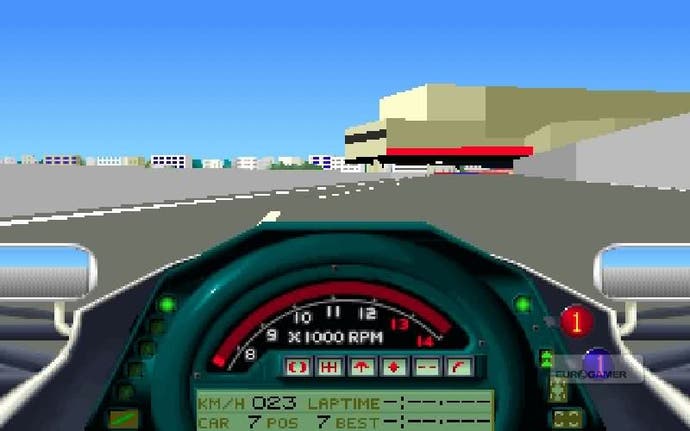Retrospective: Formula One Grand Prix
Grand Prix legend.
Taking the 1991 season as its source presented a couple of curios in its track selection as well; first there was the series of 90 degree turns through the streets of Phoenix, Arizona, an event which famously failed to attract as much attention as the local ostrich race and was duly removed from the calendar. Then there's Mexico City's track that boasts the Peraltada, the fast, open radius turn that's one of F1's great forgotten corners.
Hockenheim and Imola are also present in their rawest form, taking a snapshot of the sport before the horrific events of May 1994 robbed Grand Prix racing of its innocence. Indeed, that's another of Formula 1 Grand Prix's pleasures - in replicating the 1991 season it presents a golden era in its final blossom, with the rivalry of Prost, Senna and Mansell playing out for the last time. Sierra's Grand Prix Legends later proved the worth in capturing a pivotal moment in the history of a sport that's always in flux, and it's a shame that no commercial project has tried to repeat the trick since.
Any fidelity lost in the primitive polygons was restored by the fine details, be that the television monitor that was lowered onto the cockpit upon returning to the pits, the cloth that would wipe across the visor when stopping for tires or the marshalls that would enthusiastically wave flags from the sidelines.
Detail found its way into the handling too - quite an achievement when the game was largely played through the fumbling imprecision of a keyboard. A series of assists eased some of the pain (and Formula One Grand Prix was well ahead of its time in this regard, with steering assist and a visible racing line opening up a truly scalable difficulty level) but its precision was unprecedented.
Hitting braking points, apexes and exit points became a concern for what felt like the first time in a video game, and it was underscored by some cute touches. Take a set of the super-sticky qualifying tires out on the track - the kind of compound that makes heroics such as this possible - and they'll fall away dramatically after a couple of laps. It's the kind of feature that would take prime place on the back of the box today, yet for Formula One Grand Prix was one of its many innovations.

Indeed, the genes of Formula One Grand Prix are present not only in the dirge of F1 games that followed but also in simulations such as Forza and Gran Turismo. In its thirst for authenticity, it's a game that can lay claim to being the grandfather of a genre that's been inching closer towards creating a perfect simulation ever since.
But for me, Formula One Grand Prix was almost better than the real thing. While I was under its spell I offered up far more dedication to the PC in the attic than I did the kart in the garage, the weekends spent playing the game proving to be much less frustrating than those spent racing in the real world. It took up more time too: Fridays would be spent chasing set-ups, Saturdays given over to qualifying while on Sundays I'd complete a 100% distance race. Success came that much easier than it did behind the wheel of my own kart as I lapped the field again and again, going on to enjoy a flawless victory in the game's world championship.
And soon the school nights between races were taken up with the game too. After every practice session and each race, I'd print off the timing sheets and use them as the backbone of a weekly report that was then padded out with imagined interviews and counterfeited gossip from a virtual F1 circus. It was my own contribution to the scribbled ephemera that gaming provoked in the nineties, and my own personal testament to how involved I'd become in this world drawn from crude polygons.
Other, better racing games have come along since - such as Codemasters' pair of F1 games that can proudly claim to be the best takes on the sport since Crammond hung up his hat - though none of them have enchanted me quite as much. Much of it was down to my own circumstance, and how it gave me the slightest taste of what I so desperately wanted to be - and it's proof to me that the right game at the right time can make anything seem possible.








